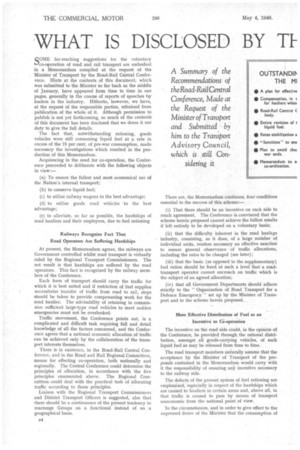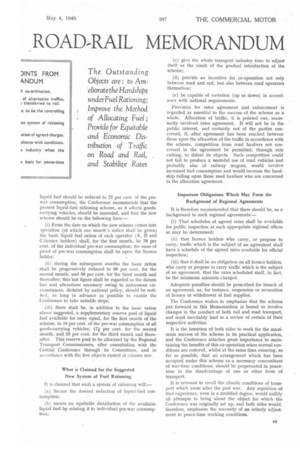WHAT IS DISCLOSED BY TF ROAD-RAIL MEMORANDUM
Page 30

Page 31

If you've noticed an error in this article please click here to report it so we can fix it.
S1(:)...AE far-reaching suggestions for the voluntary ,-/co-operation of road and rail transport are embodied in a Memorandum compiled at the request of the Minister of Transport by the Road-Rail Central Conference. Hints at the contents of this document, which was submitted to the Minister so far back as the middle of January, have appeared from time to time in our pages, generally in the course of reports of speeches by leaders in the industry. Hitherto, however, we have, at the request of the responsible parties, refrained from publication of the whole of it. Although permission to publish is not yet forthcoming, so much of the contents of this document has been disclosed that we deem it our duty to give the full details.
The fact that, notwithstanding rationing, goods vehicles were still consuming liquid fuel at a rate in excess of the 75 per cent. of pre-war consumption, made necessary the investigations which resulted in the production of this Memorandum.
Acquiescing in the need for co-operation, the Conference proceeded to deliberate with the following objects in view:—
(a) To ensure the fullest and most economical US2 of the Nation's internal transport;
(b) to conserve liquid fuel; (c) to utilize railway wagons to the best advantage; (d) to utilize goods road vehicles to the best advantage; (e) to alleviate, so far as possible, the hardships of mad hauliers and their employees, due to fuel rationing Railways Recognize Fact That Road Operators Are Suffering Hardships At present, the Memorandum agrees, the railways are Government controlled whilst road transport is virtually ruled by the Regional Transport Commissioners. The net .result is that hardships are suffered by the mad operators. This fact is recognized by the railway members of the Conference.
Each form of transport should carry the traffic for which it is best suited and if restriction of fuel supplies necessitates transfer of traffic from road to rail, steps should be taken to provide compensating work for the road haulier. The advisability of retaining in commission sufficient large-type road vehicles to meet sudden emergencies must not be overlooked.
Traffic movement, the Conference points out, is a complicated and difficult task requiring full and detail knowledge of all the factors concerned, and the Conference agrees that a national economic allocation of traffic can be achieved only by the collaboration of the transport interests themselves.
There is in existence, in the Road-Rail Central Conference, and in the Road and Rail Regional Committees, means for effecting co-operation, both nationally and regionally. The Central Conference could determine the principles of allocation, in accordance with the five principles enumerated above. The Regional Com. mittees.could deal with the practical task of allocating traffic according to those principles.
Liaison with the Regional Transport Commissioners and District Transport Officers is suggested, also that there should be a continuance of the present tendency to rearrange Groups on a functional instead of on a geographical basis. There are, the Memorandum continues, four conditions essential to the success of this scheme:— ( i) That there should be an incentive on each side to reach agreement. The Conference is convinced that the scheme herein proposed cannot achieve the fullest results if left entirely to be developed on a voluntary basis; (ii) that the difficulty inherent in the road haulage industry, consisting, as it does, of a large number of individual units, renders necessary an effective sanction to ensure general observance of traffic allocations, including the rates to be charged (see later); (iii) that the basic (as opposed to the supplementary) fuel ration should be fixed at such a level that a roadtransport operator cannot encroach on traffic which is the subject of an agreed allocation; (iv) that all Government Departments should adhere strictly to the "Organization of Road Transport for a Defence Emergency " set up by the Minister of Transport and to the scheme herein proposed.
More Effective Distribution of Fuel as an Incentive to CD-operation The incentive on the road side could, in the opinion of the Conference, be provided through the rational distribution, amongst all goods-carrying vehicles, of such liquid fuel as may be released from time to time.
The mad transport members naturally assume that the acceptance by the Minister of Transport of the proposals contained in the Memorandum would carry with it the responsibility of ensuring an incentive necessary to the railway side.
The defects of the present system of fuel rationing are emphasized, especially in respect of the hardships which are caused to hauliers in certain areas and, above all, in that traffic is caused to pass by means of transport uneconomic from the national point of view.
In the circumstances, and in order to give effect to the expressed desire of the Minister that the consumption of liquid fuel should be reduced to 75 per cent. of the prewar consumption, the Conference recommends that the present liquid-fuel rationing scheme, as it affects goodscarrying vehicles, should be amended, and that the new scheme should be on the following lines:— (i) From the date on which the new scheme comes into operation (of which one month's notice shall be given) the basic liquid fuel ration of each operator (A, B and C-licence holders) shall, for the first month, be 70 per cent. of the individual pre-war consumption; the onus of proof of pre-war consumption shall be upon the licence holder; (ii) during the subsequent months the basic ration shall be progressively reduced to 60 per cent. for the second month, and 50 per cent. for the third month and thereafter; this last figure shall be regarded as the datum line and alterations necessary owing to unforeseen circumstances, dictated by national policy, should be notified, as long in advance as possible to enable the Conference to take suitable steps;
(iii) there shall be, in addition to the basic ration above suggested, a supplementary reserve pool of liquid fuel available for issue equal, for the first month of the scheme, to 10 per cent. of the pre-war consumption of all goods-carrying vehicles; 17* per cent, for the second month, and 25 per cent, for the third month and thereafter. This reserve pool to be allocated by the Regional Transport Commissioners, after consultation with the Central Conference through its Committees, and in accordance with the five objects named in column one.
What is Claimed for the Suggested New System of Fuel Rationing
It is claimed that such a system of rationing will:—
(a) Secure the desired reduction of liquid-fuel consumption; (b) secure an equitable distribution of the available liquid fuel by relating it to individual pre-war consumption; (c) give the whole transport industry time to adjust itself as the result of the gradual introduction of the scheme; (d) provide an incentive for co-operation not only between road and rail, but also between road operators themselves; (e) be capable of variation (up or down) in accordance with national requirements.
Provision for rates agreement and enforcement is regarded as essential to the success of the scheme as a whole. Allocation of traffic, it is pointed out, necessarily involved rates agreement. It will not be in the public interest, and certainly not of the parties concerned, if, after agreement has been reached between them upon the allocation of the traffic in accordance with the scheme, competition from road hauliers not concerned in the agreement be permitted, through rate cutting, to defeat its objects. Such competition could not fail to produce a wasteful use of road vehicles and probably also of railway wagons, would involve increased fuel consumption and would increase the hardship falling upon those road hauliers who are concerned in the allocation agreement.
Important Obligations Which May Form the Background of Regional Agreements
It is therefore recommended that there should be, as a background to such regional agreements:—
(i) That schedules of agreed rates shall be available for public inspection at such appropriate regional offices as may be determined; (ii) that licence holders who carry, or propose to carry, traffic which is the subject of an agreement shall have a schedule of the agreed rates available for official inspection; (iii) that it shall be an obligation on all licence holders. who carry or propose to carry traffic which is the subject of an agreement, that the rates scheduled shall, in fact, be the minimum amounts charged.
Adequate penalties should be prescribed for breach of an agreement, as, for instance, suspension or revocation of licence or withdrawal of fuel supplies.
The Conference wishes to emphasize that the scheme put forward in this Memorandum is bound to involve changes in the conduct of both rail and road transport, and must inevitably lead to a review of certain of their respective activities.
It is the intention of both sides to work for the maximum success of the scheme in its practical application, and the Conference attaches great importance to main taining the benefits of this co-operation when normal conditions are restored, whilst at the same time ensuring, so far as possible, that no arrangement which has been accepted under this scheme as a necessary concomitant of war-time conditions, should be perpetuated in peacetime to the disadvantage of one or other form of transport
It is relevant to recall the chaotic conditions of transport which arose after the past war. Any repetition of that experience, even in a modified degree, would nullify all attempts to bring about the object for which the Conference was originally set up, and both sides would. therefore, emphasize the necessity of an orderly adjustment to peace-time working conditions.




























































